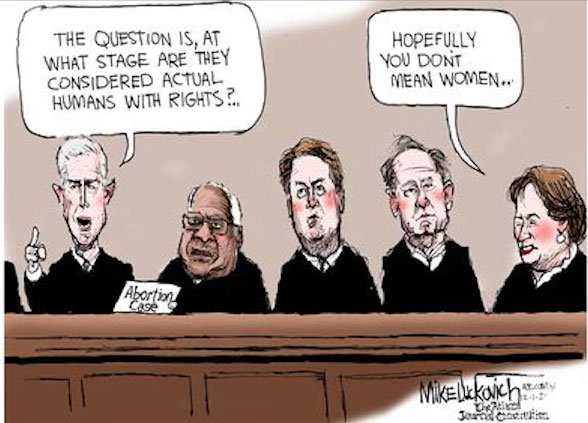Better Understanding What is at Stake
During Today’s SCOTUS Arguments
Not surprisingly, many articles have been published in recent days concerning today’s SCOTUS hearing. Reading them underscores the importance of what is as stake for all women of child-bearing age. Below are excerpts from and links to four articles which especially caught our eye.
The Associated Press
Abortion rights at stake in historic Supreme Court arguments
“The court had never agreed to hear a case over an abortion ban so early in pregnancy until all three Trump appointees — Justices Neil Gorsuch, Brett Kavanaugh and Amy Coney Barrett — were on board…
“The Mississippi case poses questions central to the abortion right. Some of the debate Wednesday is likely to be over whether the court should abandon its long-held rule that states cannot ban abortion before the point of viability, at roughly 24 weeks.
“More than 90% of abortions are performed in the first 13 weeks of pregnancy, well before viability, according to the federal Centers for Disease Control and Prevention.
“Mississippi argues that viability is an arbitrary standard that doesn’t take sufficient account of the state’s interest in regulating abortion. It also contends that scientific advances have allowed some babies who were born earlier than 24 weeks to survive, though it does not argue that the line is anywhere near 15 weeks.”
The Saporta Report
Abortion: Supreme Court ruling to determine Georgia law, influence campaigns
“The verdict is to impact Georgia’s “heartbeat bill” and is likely to resonate through the state’s 2022 campaigns…
“Georgia’s “heartbeat bill” bans abortions after a fetal heartbeat can be detected, generally in the sixth week of pregnancy. Gov. Brian Kemp signed House Bill 481 in 2019, the Living Infants Fairness and Equality (LIFE) Act.
In 2020, a U.S. District Court judge in Atlanta barred the law’s implementation. Georgia appealed the ruling to the U.S. Court of Appeals in Atlanta, where the most recent events were oral arguments presented Sept. 24, and a one-sentence ruling issued Sept. 27: “We STAY this appeal pending a decision of the Supreme Court of the United States in Dobbs v. Jackson Women’s Health Organization, No. 19-1392 (2021).”
“In Georgia’s General Assembly campaigns, the abortion issue could be pointed, especially as the Supreme Court ruling could open the door to greater state control over abortion. Candidates could call for tightening or, conversely, removing the state’s six-week ban on abortion that is pending appeal. Georgia is among 26 states that are certain or likely to ban abortion if Roe were overturned or fundamentally weakened, according to an Oct. 28 report by the Guttmacher Institute.”
The Washington Post
The unknown Supreme Court clerk who single-handedly created the Roe v. Wade viability standard
“To understand the vulnerability of Roe v. Wade, one needs to dig into the backstory of how the case was decided almost 50 years ago. And when it comes to the viability standard, all roads lead to Larry Hammond, Justice Lewis Powell’s law clerk at the time.
“Hammond’s bench memo to Powell in October 1972 is arguably the most important ever produced by a Supreme Court law clerk… The notion of using viability — the time when a fetus can survive outside the womb — had not even been argued by the litigants. It was Hammond’s suggestion.
“…Hammond argued that the Supreme Court should not be in the line-drawing business, but if it did find it necessary to do so, viability seemed the most rational point where common agreement on the court could be mustered. Based on a newly decided lower-court case out of Connecticut, Hammond reasoned that the state’s interest in protecting potential fetal life “becomes more dominant when the fetus is capable of independent existence (or becomes ‘viable’).”
Time Magazine
Inside Mississippi’s Last Abortion Clinic—and the Biggest Fight for Abortion Rights in a Generation
“If the court allows the law to remain in effect, the decision will effectively hollow out Roe v. Wade, the landmark 1973 decision that established a constitutional right to an abortion before fetal viability. “This is not gonna just affect Mississippi,” Brewer says. “It’s gonna affect women everywhere.”
“Five years ago, this moment was unthinkable. Even the Supreme Court’s decision to take up a case that directly challenges Roe would have been considered outlandish, legal scholars say. But the landscape has shifted rapidly. Over the past year, GOP-controlled state legislatures have passed a record-breaking 106 abortion restrictions, including a Texas statute that bans nearly all abortions after roughly six weeks of pregnancy. Conservative state and federal judges have allowed some of those laws to stand, while President Trump’s appointment of three Justices—Neil Gorsuch, Brett Kavanaugh and Amy Coney Barrett—has put Roe at risk. Dobbs v. Jackson Women’s Health Organization will come before the most conservative bench in decades.
“Mississippi has been the tip of the spear in this strategy. In the ’90s and 2000s, state lawmakers passed more than two dozen restrictions on abortion, each of which came with new costs, paperwork, or staffing rules that pushed abortion clinics out of business. By 2004, JWHO was the only clinic in the state left standing. Brewer says it’s still struggling to stay afloat. “There are so many hurdles,” she says.
For the patients at the Jackson clinic, navigating all of these hurdles is becoming increasingly impossible. They must take time off work, scrape together money for the procedure, which cannot be covered by Medicaid or Affordable Care Act marketplace plans in most cases in Mississippi, find money to travel to the clinic or to one out of state, pay for a hotel and potentially for childcare. A 21-year-old at the clinic on a Friday in October had driven six hours from Louisiana because she wanted the first appointment she could find. She already has two kids—a one-year-old and a three-month-old—and knew she needed to get an abortion as soon as possible because she couldn’t handle a third on her own.”

